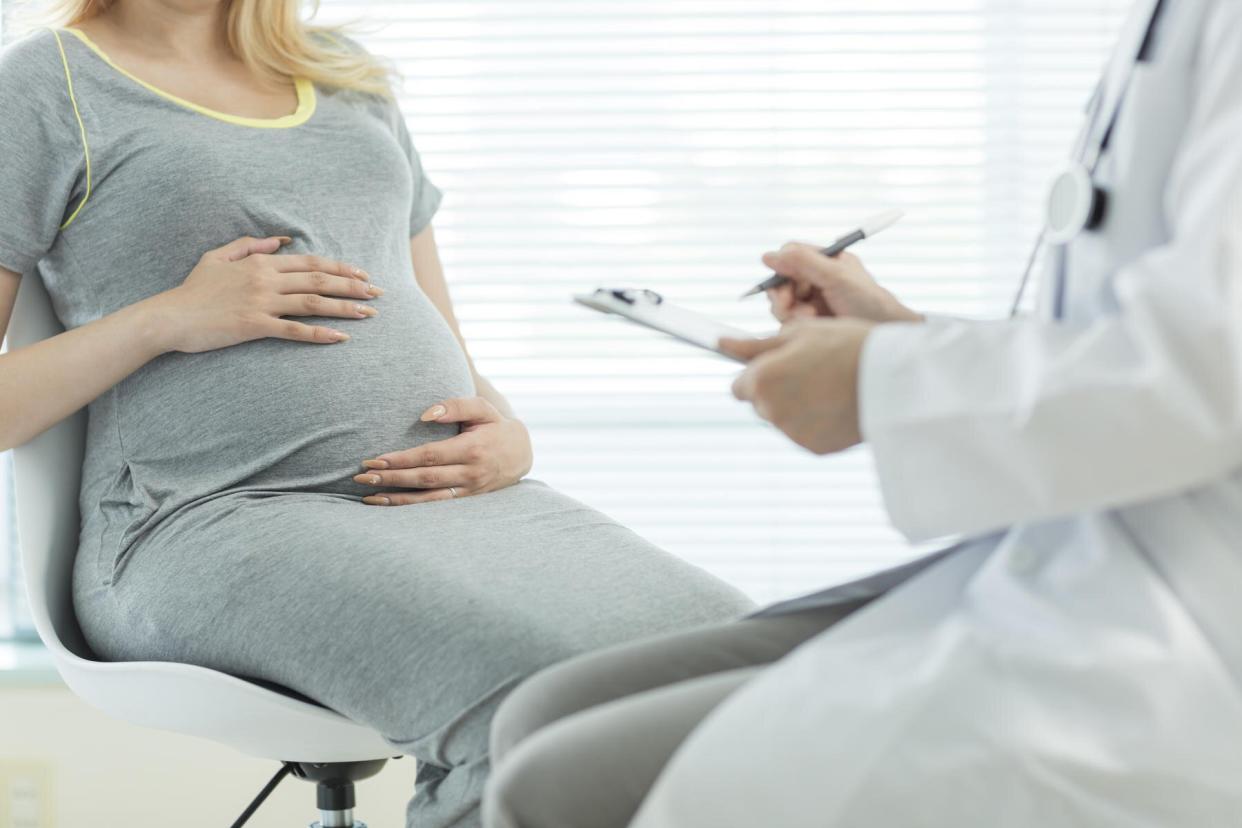Urinary Tract Infections During Pregnancy

SukiYaki/shutterstock.com
Up to 10 percent of expectant moms will get a urinary tract infection (UTI) at some point during their pregnancies, according to the March of Dimes. The good news is that UTIs are easy to treat with antibiotics when caught early.
But if an expectant mom doesn't recognize the symptoms of a UTI (or if she doesn't have any symptoms) she won't know to seek treatment – and the condition can get serious, says Dana Gossett, M.D., an Ob-Gyn at Northwestern Memorial Hospital in Chicago. About 25 percent of untreated UTIs develop into kidney infections, which can be potentially life-threatening for mother and baby.
Get the scoop on the most common causes and symptoms of UTIs during pregnancy, and learn how they're treated. We'll also give you tips that can minimize your chances of getting one.
RELATED: Vaginal Infections During Pregnancy
What is a UTI?
Your urinary tract system encompasses your urethra, bladder, ureters, and kidneys. An infection occurs when bacteria gets into this system and multiplies. Most UTIs are bladder infections and aren't serious if they're treated right away. If left untreated, a bladder infection may travel to the kidneys and cause a variety of complications, including preterm labor, a low birthweight baby, and sepsis.
What Causes UTIs During Pregnancy?
Whether you're pregnant or not, sex is the most common culprit for UTIs because bacteria from the colon and vagina can get into the urethra during foreplay and intercourse, says Kristene E. Whitmore, professor and chair of urology at Drexel University College of Medicine and Medical Director of the Pelvic and Sexual Health Institute, both in Philadelphia. Vigorous sex can cause bladder inflammation, which makes it easier for bacteria to stick around, Dr. Whitmore says. Other causes of UTIs include infrequent urination, because urinating effectively clear germs from your bladder and urethra, and urinary tract abnormalities or chronic conditions such as diabetes.
Pregnancy doesn't cause UTIs – after all, 1 woman in 5 will develop a UTI in her lifetime, according to the National Kidney & Urologic Diseases Information Clearinghouse. But the physical changes that take place during pregnancy make you more susceptible to an infection.
For starters, hormonal changes create the ideal environment for UTI-causing bacteria (usually Escherichia coli known as E. coli) to flourish, explains Myra J. Wick, M.D., Ph.D., a specialist in obstetrics at the Mayo Clinic in Rochester, Minnesota. The increase of progesterone causes the muscles that line the urine-making urethras to relax, which can allow bacteria to rise up into the bladder and possibly the kidneys more easily than when you're not pregnant. Your enlarged uterus can also prevent you from emptying your bladder completely when you urinate, and this leaves a pool of urine in which bacteria can multiply, Dr. Wick adds.
RELATED: 17 Tips for a Healthy Pregnancy
What are the Symptoms of UTIs?
Some pregnant women do not experience any symptoms at all; they have what's called asymptomatic UTIs. Your Ob-Gyn will screen for asymptomatic UTIs at your first prenatal appointment (and perhaps subsequent visits, too). If you have a symptomatic UTI, you might experience any one or combination of these symptoms:
Urinary urgency, meaning a quick and sudden urge to urinate
Pain or a burning sensation with urination
Foul-smelling or cloudy urine
Bloody urine
Pain in the pubic bone area
How to Treat UTIs During Pregnancy
The good news is that most UTIs are easy to treat, even when you're pregnant. "Although there are some medications that pregnant women must avoid, most antibiotics are safe," says Dana Rigsby Gossett, M.D., an Ob-Gyn at Northwestern Memorial Hospital in Chicago. "Any obstetrician will know which antibiotics to avoid, and the choice of antibiotic depends on a woman's allergies and what trimester of pregnancy she is in. There are many different safe options."
RELATED: Pelvic Pain During Pregnancy
How to Prevent UTIs While Pregnant
There is no foolproof way to prevent urinary tract infections, but you can take several preventive measures to help minimize your chances of getting one.
Practice good hygiene. Wipe from front to back after you urinate to prevent the spreading of bacteria.
Stay hydrated. Urinating is an effective way of clearing germs from the bladder and urethra. Try to drink about eight 8-ounce servings of liquids a day.
Urinate before and after sex. This will help eliminate genital bacteria.
Urinate frequently. Go when you feel the urge to go, and spend the extra few minutes to be sure you have emptied your bladder completely.
Watch your diet. Caffeine and chocolate are a few of the substances that can irritate the bladder, and inflammation makes bacteria more likely to stick around.
Drink cranberry juice. Cranberries can prevent E. coli from adhering to the bladder. Consult your Ob-Gyn or midwife before you pop cranberry pills or capsules.

